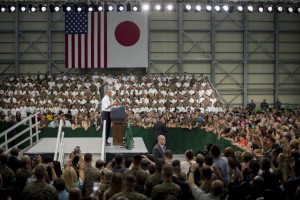
Obama, who arrived at Iwakuni after attending the G7 Summit in central Japan, hailed the “great alliance” between the United States and Japan on May 27, just hours ahead of his historic visit to Hiroshima. / AFP PHOTO / JIM WATSON
HIROSHIMA, United States (AFP) — President Barack Obama is set make history on Friday as he travels to Hiroshima — becoming the first sitting US leader to visit the site that ushered in the destructive power of the nuclear age.
The trip comes more than seven decades after the world was first shown the potential keys to its own destruction when an American plane, the Enola Gay, dropped its payload, dubbed “Little Boy” over the western Japanese city.
The bombing claimed the lives of 140,000 people, some of whom died immediately in a ball of searing heat, while many succumbed to injuries or radiation-related illnesses in the weeks, months and years afterwards.
The US dropped a second bomb on the city of Nagasaki three days later.
Coming in Obama’s final year in office, the visit also marks seven years since he used his trademark soaring rhetoric to call for the elimination of atomic arms in a landmark speech in Prague that helped him win the Nobel Peace Prize.
And while the world of today appears no closer to that lofty vision, Obama is expected to use the symbolism of his presence in Hiroshima to point up present dangers.
“I want to once again underscore the very real risks that are out there and the sense of urgency that we all should have,” he told reporters on Thursday at a Group of Seven summit in Japan.
“Our visit to Hiroshima will… reaffirm our shared vision of a world without nuclear weapons,” he said earlier in the week, revisiting a phrase uttered in the Czech capital.
He is to be accompanied by Japanese Prime Minister Shinzo Abe, whose presence would “highlight the extraordinary alliance” forged between Japan and the United States from the ashes of war, Obama said.
Obama is expected to lay flowers at the cenotaph in Hiroshima Peace Memorial Park in the shadow of a domed building, whose skeleton has been left standing in silent testament to the victims of the first ever nuclear attack.
He will also speak at the spot in the presence of at least three atomic bomb survivors, public broadcaster NHK reported.
“If I were given time to exchange words with President Obama, first and foremost I want to express my gratitude for him to have come to Hiroshima,” Sunao Tsuboi, 91, a Hiroshima survivor and anti-nuclear campaigner, told NHK.
“I have no intention to ask him for words of apology.”
Some quarters of Japanese society, however, have called for such a gesture, though Obama said one will not be forthcoming and that he has no intention of revisiting the decision of his predecessor Harry Truman at the close of World War II.
While some in Japan feel the attack was an abomination because it targeted civilians, many Americans say it hastened the end of a brutal and bloody conflict, and ultimately saved lives.
bur-kgo/hg/rb
© 1994-2016 Agence France-Presse








